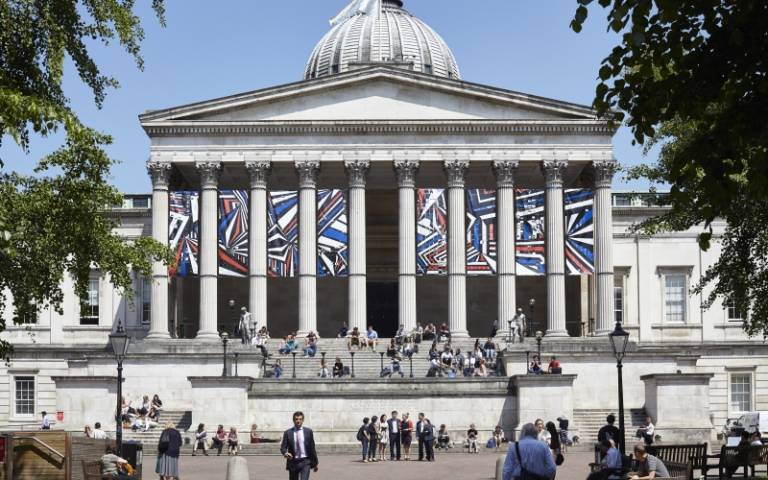Vice-Provost’s View: The future of research is… open
9 October 2019
The start of a new academic year (in an increasingly turbulent external context) provides a good opportunity to reflect on the future of research at UCL, writes Professor David Price, Vice Provost (Research).

I make every attempt to celebrate the remarkable achievements of our researchers and research groups, as well as our deservedly rising institutional reputation. That does not, however, mean that we should rest on our many laurels. As I wrote in the introduction to the 2019 UCL Research Strategy:
It falls to each generation of the UCL community to remind its successors of the special responsibilities gifted to us by our founders. And it falls to each successive generation to reinterpret UCL’s radical tradition in response to their contemporary circumstances and the needs of society.
We need to ensure that UCL in the 21st century and beyond fulfils its potential to be fundamentally embedded in society, genuinely open to all, cherishing the pursuit of knowledge for its own sake while being committed to tackling the wickedest of wicked problems.
I believe that making our research open in every way is the key to us fulfilling our potential.
An excellent new website developed by UCL Library Services provides advice and guidance on open science (synonymous with open research and open scholarship) and the eight ‘pillars’ that underpin it: ‘FAIR’ data; education and skills; research integrity; next-generation metrics; rewards and initiatives; the European open science cloud; the future of scholarly communication; and citizen science
Of course, UCL has been at the forefront of supporting open access and open data, part of the open and transparent research agendas. I am immensely proud of our institutional achievements, from UCL Discovery to UCL Press to the new UCL Research Data Repository. Effectively sharing all of the products of our research – from datasets (where allowed and appropriate) to academic publications to blogs and articles – with the widest possible audience is critical to our purpose of generating and applying new knowledge. That kind of openness underpins our relevance to contemporary society.
Sharing knowledge, however, is not just about ‘dissemination’ but about our community being effective and proactive at engaging with others beyond the university. We should strive to ensure that academic knowledge is accessible and is integrated with other forms of expertise. We must embrace our role as knowledge brokers as well as knowledge generators in order to bring together and apply different and emerging forms of knowledge.
While our university is and should continue to be a special and distinctive community, it should not be closed off from wider society. We must be much more ambitious in building external partnerships and broad alliances, working with partners from business to policy communities to civil society groups. Inspiring examples include the Lancet Countdown: Tracking Progress on Health & Climate Change, and a collaboration between the UCL Grand Challenge of Justice & Equality, UCL Public Policy and the Resolution Foundation on Exploring Inequalities: Igniting Research to Better Inform UK Policy.
Open research and an open research community also mean remaining open to global partnerships. My office is working with the UCL Global Engagement Office to explore how UCL, institutionally, could better support the many ways in which our community can contribute to the UN’s Sustainable Development Goals (SDGs). If you’d like to offer suggestions, please get in touch. We are keenly aware that the SDGs relate to everyone, not just the developing world, so we also need to ensure that our research can respond to and help to address societal problems in London and the UK’s regions.
We must work harder to become an institution open to people from all backgrounds, in both research roles and across professional services. We talk routinely about wanting to attract the best global talent; this will require concerted efforts and a commitment to go beyond the ‘usual suspects’ and recruit those from under-represented and non-traditional backgrounds. We need to think seriously about how we manage recruitment, development and retention in order to achieve, for example, greater ethnic, gender and socioeconomic diversity in senior research and academic roles.
We also need to develop the right kind of ‘leaky pipeline’, one which enables greater fluidity in academic careers and doesn’t disadvantage those who bring experience from other sectors. The next generation of researchers, quite rightly, want to be able to gain and apply multiple kinds of experience and expertise. We need our research community to be open to wider expertise, and think about new kinds of career pathways to enable this.
Finally, as a knowledge institution, we need to be open to criticism and challenge; to listen to and acknowledge difficult truths; and to always strive to improve. At the same time, as an upholder of knowledge and defender of evidence, we must reaffirm our commitment to speak inconvenient truths unto power.
And openness is not just for research. As a community of academics and those who support them, we need to continue to embrace openness: we should be innovative in our schemes to open up the student body, be ambitious in our partnerships with business, cultural, civic and policy organisations, and pursue a new relationship with the city that is our home.
I urge everyone at UCL to think about their commitment to being open, and what they need to do to achieve it. My commitment is to do as much as possible to ensure our research environment enables every member of our community to embrace an open future.
Prof David Price, Vice-Provost (Research)
 Close
Close

